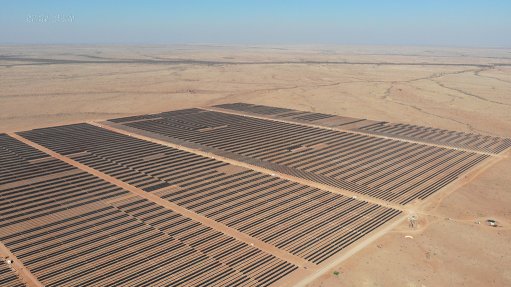Five ways to tread a little lighter this Earth Day
This article has been supplied as a media statement and is not written by Creamer Media. It may be available only for a limited time on this website.
Earth Day is celebrated annually on 22 April. Now in its 49th year, Earth Day is one of the largest observances in the world with one billion people in 192 countries participating in activities each year1. ‘Protect Our Species’, the theme for this year’s Earth Day calls on all citizens around the world to be aware of and work together to protect endangered and threatened species.
“The Institute of Waste Management of Southern Africa (IWMSA) would like to encourage South Africans to consider their ecological footprint this Earth Day and every day thereafter,” says Leon Grobbelaar, President of the IWMSA.
Here are the IWMSA’s five recommendations to tread a little lighter this Earth Day:
Calculate your carbon footprint
“Our carbon footprint ultimately contributes towards climate change. Rising temperatures pose a threat to many vulnerable ecosystems, such as marine environments. Climate change and global warming is not a new idea and I think that everyone should get to grips with their personal carbon output,” says Grobbelaar. What can be measured, can be managed and the same goes for your carbon footprint.
Calculate your carbon footprint by using an online tool, such as this useful carbon calculator powered by Carbon Footprint.
Reduce your waste output
Conscious consumerism is vital to reducing your waste output. Before you use or purchase items consider the ‘6 R’s of waste management’:
Reduce: Purchase items that make use of less packaging.
Rethink: It should be part of your daily routine to rethink every item you want to purchase or consume and the potential impact it may have on the environment.
Refuse: Refuse buying or consuming items that only add to waste generation, for example single use plastics such as straws.
Recycle: Separate your recyclable materials at home and drop them off at your local recycling depot.
Reuse: Before you throw items away, think about if and how they can be repurposed. There are many creative upcycling ideas available online.
·Replace: Research environmentally friendly and sustainable products that could be a better option to everyday consumer goods.
Source sustainable products
“Before purchasing products read the labels and do some research on the farms where products come from. Certain products are certified with an ecolabel,” says Grobbelaar. Here is a list of some of the South African product ecolabels to look out for.
Bees are one of the species that have been identified by the Earth Day Network facing extinction.1 Current threats to bees include the use of pesticides, climate change, loss of biodiversity and unethical beekeeping practices.
Buying organic honey produced by individual beekeepers, who practice balanced beekeeping, helps to address environmental issues around agrochemicals. Visit Ethical Consumer for sourcing sustainably produced honey and other products.
Support your local environmental NGO
Get involved in your local environmental NGO, visit NGO Pulse to find out more about the NGO’s in your area. If you are in Cape Town look out for Greenpop, an organisation that focusses on spreading environmental awareness by planting trees through urban greening and reforestation projects.
There are also a few ways to get involved in the work that the World Wildlife Fund for Nature (WWF) South Africa does to protect our country’s natural heritage.
Plant your own indigenous garden
Indigenous gardens promote biodiversity and are easy to grow due to accustomed climatic and environmental conditions. Having an indigenous garden will encourage other species, such as birds, to inhabit the same area. Indigenous gardens are water wise and are suitable for all seasons.
“With these easy steps, everyone can make every day Earth Day and contribute to realising the IWMSA’s vision of a clean and healthy environment for all,” concludes Grobbelaar.
Share your Earth Day initiatives, whether it be an at home recycling system or indigenous garden, with us on our Facebook page: https://www.facebook.com/iwmsa.
For more information on the IWMSA, visit www.iwmsa.co.za.
Comments
Press Office
Announcements
What's On
Subscribe to improve your user experience...
Option 1 (equivalent of R125 a month):
Receive a weekly copy of Creamer Media's Engineering News & Mining Weekly magazine
(print copy for those in South Africa and e-magazine for those outside of South Africa)
Receive daily email newsletters
Access to full search results
Access archive of magazine back copies
Access to Projects in Progress
Access to ONE Research Report of your choice in PDF format
Option 2 (equivalent of R375 a month):
All benefits from Option 1
PLUS
Access to Creamer Media's Research Channel Africa for ALL Research Reports, in PDF format, on various industrial and mining sectors
including Electricity; Water; Energy Transition; Hydrogen; Roads, Rail and Ports; Coal; Gold; Platinum; Battery Metals; etc.
Already a subscriber?
Forgotten your password?
Receive weekly copy of Creamer Media's Engineering News & Mining Weekly magazine (print copy for those in South Africa and e-magazine for those outside of South Africa)
➕
Recieve daily email newsletters
➕
Access to full search results
➕
Access archive of magazine back copies
➕
Access to Projects in Progress
➕
Access to ONE Research Report of your choice in PDF format
RESEARCH CHANNEL AFRICA
R4500 (equivalent of R375 a month)
SUBSCRIBEAll benefits from Option 1
➕
Access to Creamer Media's Research Channel Africa for ALL Research Reports on various industrial and mining sectors, in PDF format, including on:
Electricity
➕
Water
➕
Energy Transition
➕
Hydrogen
➕
Roads, Rail and Ports
➕
Coal
➕
Gold
➕
Platinum
➕
Battery Metals
➕
etc.
Receive all benefits from Option 1 or Option 2 delivered to numerous people at your company
➕
Multiple User names and Passwords for simultaneous log-ins
➕
Intranet integration access to all in your organisation


















